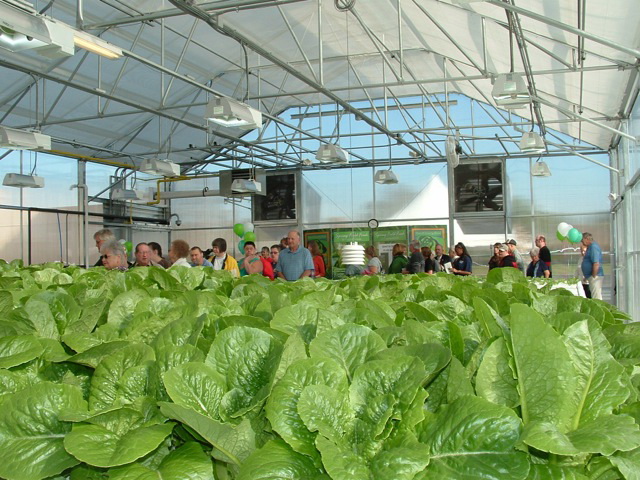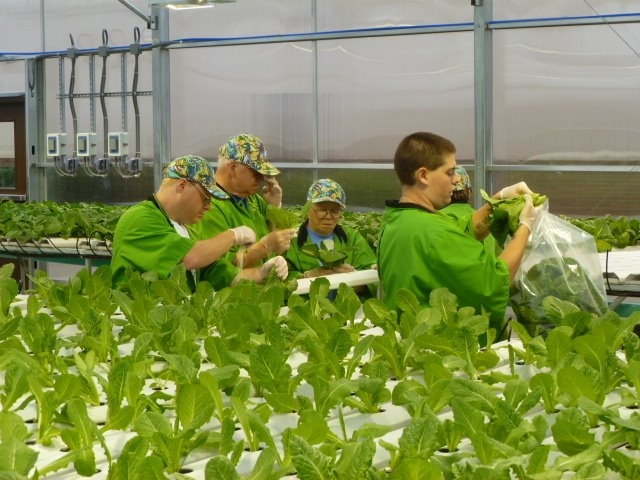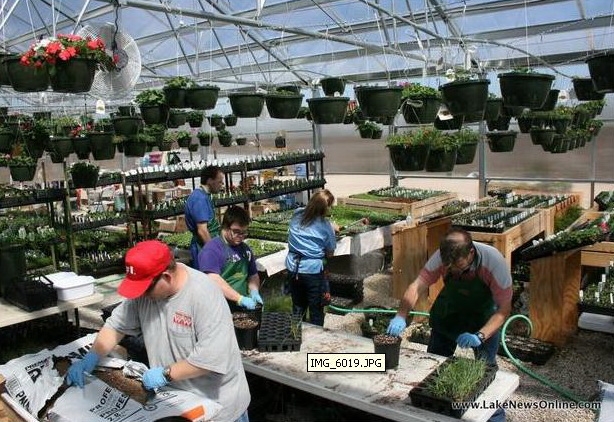
With a focus on reclaiming water, growing healthy food for schools and non-profit organizations, creating green jobs and reducing global warming in the Bay Area, the Coco San Sustainable Farms collaboration between the Central Contra Costa Sanitary District in Martinez, CA and AgLantis TM, a non-profit organization that has a triple bottom line – social, economic and environmental. A business model that provides healthy, fresh and sustainably produced local food and education for the community, this cutting-edge project is the first of its type in the entire country and a true groundbreaking enterprise in many ways.
With a 144’ X 42’ top-of-the-line Solar Light greenhouse donated by Agra Tech in Pittsburg, CA, one of the world’s largest manufacturers of commercial greenhouses, the CoCo San Sustainable Farm will soon be growing produce on its 14.8 acres of public buffer land, using reclaimed, agricultural-grade water that would otherwise be discharged into the bay.

Carolyn Phinney is a retired UC Berkeley Ph.D. behavioral scientist, is the President of AgLantis and Executive Director of the CoCo San Sustainable Farm and the driving force behind this innovative project. She has already received an outstanding activist award for her work. “We’ll be growing fresh produce very soon using sustainable methods for local schools, the Contra Costa County Food Bank and CSAs (Community Supported Agriculture boxes),” Phinney explained.“This year we will have a high-tech hydroponics greenhouse donated by Agra Tech, Inc, in operation, which will managed by our expert staff and volunteers.”
The farm will also be a school, according to Phinney. “One of our goals is to provide useful, hands-on science and engineering classes concerning soil science, water science, permaculture, sustainable organic agriculture, integrated-pest-management, low water use gardening and hydroponic greenhouse management. Every aspect of science touches a farm such as physics, soil science, hydrology, meteorology, and nutrition. We are working with the State Superintendent of Public Instruction, a Teacher of the Year, the Community College Board, Diablo Valley and Los Medanos Community Colleges, JFKU and an expert who created internships for NASA to integrate the farm into school curricula.”
Food for local schools is a major priority for the CoCo San Sustainable Farm, Phinney said. “It costs about a dollar a day to feed a child a salad and most schools can’t afford that. The Contra Costa Food Bank cannot get a large supply of salad vegetables because they are highly perishable and only available locally from small backyard gardening. We will be providing low-cost sustainably grown produce for schools, the Contra Costa/Solano Food Bank and the community.”
Reclaiming water during one of California’s worst droughts of all time is a big deal and an integral part of the sustainability of its farm. Nearly 1 trillion gallons of reclaimed water are discharged into the greater San Francisco Bay waterways each year, according to the project’s web site salads4schools.org. “UC Davis estimated the water shortfall in California’s Central Valley was 2.1 trillion gallons this past year and we dumped about half that much in the Bay Area alone,” Phinney said. “This water is high in nitrogen and phosphorus which is bad for the Bay, but great for agriculture, thereby providing us with free fertilizer. All it requires is one more treatment to make it ideal for agriculture, so why not take this water and use it to grow food, as opposed to letting it go into the Bay?” Furthermore, there are thousands of acres of public buffer land near the recycled water sources in this county alone, which can be used to grow produce and reduce nutritional poverty in our community.

Most people probably don’t realize that growing food contributes considerably to global warming, Phinney explained. “It makes up 25% of all global warming, because the state pumps water to farmers in the Central Valley using much electricity to do so. Then, we truck our produce to cities, using much gas to do so. The fertilizers that nonorganic farming uses also contribute to global warming. By using recycled water high in natural fertilizer and the public buffer land surrounding the water reclamation facilities and eating the produce locally, we’re nearly eliminated most of the carbon footprint of farming at the CoCo San Sustainable Farm.”
The farm will also be an incubator for green jobs, Phinney said. “We will partner with other local businesses to showcase their products and teach about jobs that are directly related to these industries. We’re in a great position to train people in high-tech organic agricultural methods in our new greenhouse, donated by Agra Tech, Inc., we can teach greenhouse growing as well, which is exciting. Hydroponics greenhouse growing can produce as much as 40 times the produce with 10% of the water. We believe hydroponics greenhouse growing right in the center of urban areas using recycled water and land nearby is the future of agriculture.”
Written by Ed Attanasio
TrustED Advertising
Published on:
12/12/2014
Post by:
Admin
Category:
Greenhouses
Tag(s):
#AgLantis TM
#Agra Tech
#Carolyn Phinney
#Central Contra Costa Sanitary District
#CoCo San Sustainable Farm
#Largest manufacturers of commercial greenhouses
#Solar Light greenhouse
#UC Berkeley
We work closely with Jim Bergantz, our Agra Tech sales rep and he handles everything well for us. We’re extremely happy working with Agra Tech and that’s why we’ve bought so many greenhouses from them. If we have questions or need something above and beyond from these people, they don’t hesitate to come through for us. Their customer service is exceptional across the board. We’ve worked with Agra Tech on so many greenhouses that we’ve got it down to a science by now.
Read article: Growing Demand at Woods Transplants
Woods Transplants
Mark Woods
Gustine, CA